Breakthrough Studies Bring New Hope to Breast Cancer Survivors

Researchers at Dana-Farber Cancer Institute are making breakthrough discoveries that will significantly enhance the quality of life in breast cancer survivors. Here, three landmark studies presented at the ESMO Congress 2024 in Barcelona, Spain are discussed, where issues related to the safety of breastfeeding after diagnosis and a telephone-based coaching program for promoting physical activity in patients surfaced.
Safety of Breastfeeding After a Breast Cancer Diagnosis
The two studies investigated the impact of breastfeeding among young women diagnosed with breast cancer. The first study was a multicenter collaboration of research from 78 hospitals and cancer centers in 31 countries that assessed 474 patients with inherited mutations in the BRCA1 or BRCA2 genes. The patients had ages less than 40 years with Stage I-III invasive breast cancer.
These women were followed up for a median time of seven years after delivery. Results showed that it did not make any significant difference whether a woman had nursed or not for the recurrence of cancer. This would mean cases of cancer within the primary tumour site and the contralateral breast; therefore, it shows that breastfeeding does not increase the risk of cancer recurrences or new cancers in such patients.
The second study was derived from the POSITIVE trial, with the main objective to understand if the temporary interruption of endocrine therapy to conceive is safe in women presenting with hormone receptor-positive (HR+) breast cancer. For this study, the participants included 518 women of age 42 or less, with 317 having fulfilled the definition for a live birth, and 196 opting to initiate breastfeeding. Results The outcomes of the study summarized above showed that these women could safely and feasibly breastfeed.
However, the safety only occurred in patients who had received a breast-conserving surgery. Dr. Ann Partridge, co-investigator of the two studies, stressed that these findings were greatly significant, providing crucial evidence that breastfeeding is indeed possible for younger survivors of breast cancer. In her statement, "Our findings highlight the potential to support maternal and infant needs without compromising maternal safety," referring to the significance of both maternal health and infant care needs have to be attended to.
Encouraging Physical Exercise through Coaching
Improving Overweight Breast Cancer Survivors' Levels of Physical Activity Using a Telephone-Based Coaching Program: BWEL Trial In the third study, we aimed to improve overweight breast cancer survivors' levels of physical activity through a telephone-based coaching program. This study took place within the Breast Cancer Weight Loss (BWEL) trial, where we were interested in understanding whether there was any potential for structured weight loss interventions to decrease risks of cancer recurrence among women whose BMI fell into the overweight and obese categories.
3,180 women were randomly assigned to either of two groups. In one group, phone-based coaching aimed at lowering caloric intake and increasing exercise; in the second group, health education materials alone were provided. The baseline measurements are revealing as it presents that intervention arm women are largely inactive and, after six months, increased their average weekly exercise by as much as 40 minutes. Control group: The level of physical activity was not increased at any point in time.
The findings also showed that the subjects who had at least 150 minutes per week of moderate to vigorous intensity physical activity were losing more weight as compared to those that were not. Dr. Jennifer Ligobel, a researcher of this study, noted that "a telephone-based weight loss intervention can stimulate this group of patients into being more active." The present study is expected to determine whether such increases in physical activity will translate into better cancer outcomes over a longer term.
Implications for Future Research and Patient Care
Together, they outline a critical step forward in the understanding of how lifestyle choices after diagnosis of cancer might themselves modify survivorship. The safety of breastfeeding by young mothers after diagnosis of breast cancer may reassure many women wrestling with agonizing decisions about motherhood after treatment. Also, effective interventions, such as telephone-based coaching, may empower patients to take greater control over their health, being more active physically and managing weight better.
Indeed, in the long term, further insight will be developed from observation of these patients by researchers on how lifestyle changes could improve general outcome in health for breast cancer survivors. Implications may unlock avenues to include supportive measures in standard care for the woman who navigates the 'aftermath of treatment' for breast cancer.
And so, in conclusion, these pioneering studies by Dana-Farber Cancer Institute not only give breast cancer survivors who are young pieces of mind concerning breastfeeding but equally remind the society of innovative approaches to improve their well-being through structured support programs.
Business News
Wendy's Just Reversed Course From New Approach With 'Project Fresh,' Following A Hefty Sales Hit.
How to Transform the Workplace into a Safe Space
Best Link Building Service Explained: Features, Strategies, and SEO Insights
The Science of A/B Testing: How Small Tweaks Create Big Wins in Marketing
Why Primary Care Doctors Are Embracing Telemedicine and Digital Health Tools




















